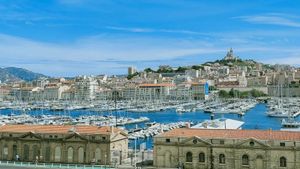Serbia has found itself at the crossroads of tragedy and activism as residents across the country engage in persistent anti-government protests. These demonstrations follow the catastrophic collapse of a concrete canopy at the railway station building in Novi Sad, which resulted in the deaths of 15 individuals last month. On Fridays, at precisely 11:52 AM—the moment this disaster struck—hundreds of citizens halt their daily routines to observe 15 minutes of silence, paying homage to those who lost their lives.
The protests, which began on November 1, reflect widespread dissatisfaction with the Serbian government, particularly against the backdrop of allegations surrounding responsibility for the canopy's collapse. Traffic blockades have become a common occurrence every week as individuals express their anger toward what they perceive as neglect and corruption within the government. Residents are united not just by grief but by their demand for accountability.
Many Serbians are questioning how such an incident could occur, especially since the railway station building had undergone two renovations within recent years. For the local populace, it symbolizes more than just infrastructural failure; it embodies fears of rampant corruption affecting public safety. Even though the canopy's collapse transpired on a clear and sunny day, it quickly morphed from an ordinary afternoon to one etched with sorrow. According to reports, individuals were leisurely enjoying the day, completely unaware of the impending tragedy as the canopy gave way above them.
“Many believe rampant corruption led to sloppy work on the building reconstruction,” one resident remarked, highlighting the frustration felt by numerous citizens who think accountability is evasive within the current regime. These sentiments are not baseless. The involvement of Chinese state companies, which completed the renovations as part of broader railway projects, adds another layer of concern for citizens who are becoming increasingly vigilant about safety and quality standards.
The dramatic sight of people blocking roads and pausing to reflect on the victims serves as potent imagery—one of grief morphing swiftly to anger. Within just one month, what commenced as collective mourning for loss has established itself as sustained opposition against the government's failures. Large groups assemble weekly, not only to honor the lost lives but to challenge the broader issues of governance affecting their safety and lives.
The protests also reflect wider sentiments toward Serbia's populist government. For many people, this is not just about one accident but indicative of systemic issues plaguing governance. Residents are demanding tangible changes and greater oversight of construction projects as constructive measures to prevent future tragedies. Indeed, casualties caused by governmental negligence fuel the unrest seen on the streets. Protesters chant, displaying placards, and voice their frustrations, effectively calling for action beyond mere words.
Through each silent tribute and traffic blockade, the message remains clear: the Serbian people are no longer willing to accept diminished standards whenever it concerns public safety. They are unwilling to sit silently as their grievances go unaddressed, drawing attention toward risks embedded within the structure of government itself. Citizens’ resolve is evident as they beckon the authorities to recognize their pleas for change.
The general atmosphere across Serbia now serves as both a memorial to the fallen and as the sounding board for the populace’s heated demands for government accountability. Public trust is fragile, and with each subsequent protest, the government faces increasing pressure to respond adequately to the growing waves of dissent. By mobilizing en masse, residents seek not just to commemorate lives lost but to secure justice and reform across various sectors.
The tragic roof collapse has ignited a flame of activism unmatched by previous protests. It has handed the government critics prima facie evidence of its failures—a tragic lesson learning opportunity demonstrating how negligence must never be tolerated. The people of Serbia stand united as they silently advocate for those lost and simultaneously call for systemic reform, forging their path forward as persistent activists demanding real change.
Through these measures, they hope to prevent such tragedies from recurring, ensuring safety as the utmost priority. The strength with which Serbian citizens continue to collectively articulate their discontent leaves no doubt: their movement is just the beginning of what may become one of the most significant calls for accountability the nation has yet seen.



